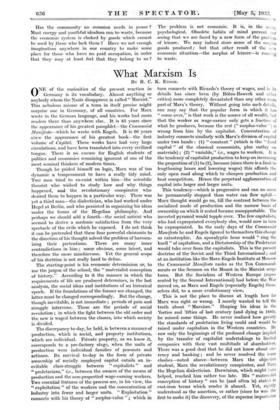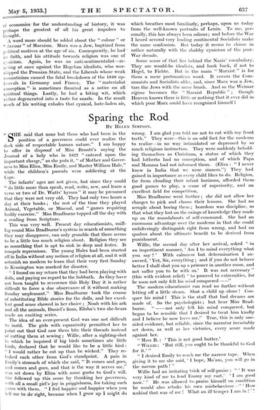What Marxism Is
BY R. C. K. ENSOR.
ONE of the curiosities of the present reaction in Germany is its vocabulary. Almost anything or anybody whom the Nazis disapprove is called " Marxist." This nebulous misuse of a term in itself precise might surprise one in Germany, of all countries. For Marx wrote in the German language, and his. works had more readers there than anywhere else. It is 85 years since the appearance of his greatest pamphlet—the Communist Manifesto—which he wrote with Engels. It 'is 66 years -"since the appearance of his greatest book—the first volume' of Capital. These works have had very large circulations, and have been translated into every civilized tongue. There is no excuse for English students of politics and economics remaining ignorant of one of the most seminal thinkers of modern times.
Though he prided himself on logic,' Marx was of too dynamic a temperament to have a really tidy mind. Two men tried to co-exist within him—the scientific theorist who wished to study how and why things happened, and the revolutionary conspirator who desired them to happen in a particular way; There was 'yet a third man—the dialectician, who had worked under Hegel at Berlin, and who persisted in organizing his ideas under the forms of the Hegelian philosophy. And perhaps we should add a fourth—the social satirist who seemed to derive a sardonic satisfaction from the: very spectacle of the evils which he exposed. I do not think it can be pretended that these four powerful claimants to the direction of his thought solved the problem of harmon- izing their pretentious. There are many inner contradictions in him ; some obvious, some latent, and • therefore the more mischievous. Yet the general scope • of his doctrine is not really hard to define.
The starting-point is his economic determinism or, to use the jargon of the school, the " materialist conception of history." According to it the manner in which the requirements of life are produced determines, in the last - analysis, the social ideas and institutions -of an historical epoch. If the foundations of the former are changed, the latter must be changed correspondingly. But the change, though. inevitable, is not immediate ; periods of pain- and struggle intervene. These are the periods of social revolution ; in which the fight-between the old order and the new is waged between the classes, into which society is divided.
The discrepancy to-day, he held, is between a manner of production, which is, social, and property institutions, • which are individual. Private property, as we know it, corresponds to a pre-factory -stage, when the units of production were individual families of peasants and artisans. Its survival to-day in the form of private ownership of socially employed capital entails an in- evitable class-struggle between " capitalists " and " proletarians," i.e., between the owners of the means of production and the non-propertied wage-earning workers. Two essential features of the process are, in his view, the " exploitation " of the workers - and the concentration of industry into fewer and larger units. " Exploitation " connects with his theory of " surplus-value " ; which in turn connects with Ricardo's theory of wages, and in its details has since- been (by Bohm-Bawerk -and other critics) more completely devastated than any other main part of Marx's theory. Without going into such details, one may say that the popular form in which it has " come over," is that work is the source of all wealth, but that .the worker as wage-earner only gets a fraction of what he produces, because the rest (" surplus-value ") is wrung from him by the capitalist. Concentration of industry connects similarly with Marx's division of capital under two heads : (1) " constant " (which is the " fixed capital " of the classical economists, plus outlay on materials) ; (2)-" variable," i.e., wages to workers. It is . the tendency of capitalist production to keep on. increasing the proportion of (1) to (2), because (since there is a limit to lengthening hours and lowering, wages) this .affords the only open road along which to - cheapen production and beat competitors. Hence the perpetual agglomeration of capital into larger and larger units.
This tendency—which is progressive and can no more be permanently stopped than water can flow uphill— Marx thought would go on, till the contrast between the socialized mode of production and the narrow basis of ownership on -which it rested became unsupportable. The inverted pyramid would topple- over.. The few•capitalists, . who had expropriated everybody else, would now in turn be expropriated. In the early days of the Communist Manifesto he and Engels figured to themselves this change as catastrophic. An apocalyptic hour would " ring the knell " of capitalism, and a Dictatorship of the Proletariat _would take over from the capitalists. This is the present doctrine of the Soviet and the Third. International ; and at an institution like the Marx-Engels Institute at Moscow the Communist Manifesto ranks as the Ten Command- ments or the- Sermon on the Mount•-im the Marxist scrip- tures. But the -Socialism of Western Europe; (repre- sented by the Second International) had before the War moved on, as Marx and Engels (especially Engels) them- selves did, to a more evolutionary view: This is not the place to discuss at, length how far Mark was right or wrong. • I merely wanted to tell the truth about " Marxism." Shaping his ideas in the 'forties and !fifties of last century (and• dying in 1883), he missed some things. He never -realized how greatly the standards of proletarian living could and would be raised under - capitalism in the Western countries. He - saw only the -beginnings of the profound change implied by the transfer of capitalist undertakings to limited companies with their vast multitude of shareholders. There was a good deal that he did not know about cur- - rency and banking ; and he never resolved the inner clashes—noted above—between Marx the objective student, Marx the revolutionary conspirator, and Mars the Hegelian dialectician. Darwinism, which might have helped, reached him rather too late. His ." materialist conception of history " can be (and often is) stated in cast-iron terms which render it absurd. Yet, rightly understood as the assertion, or rather (since he was the first to make it) the discovery, of the supreme importance of economics -for the understanding- of history, it -was perhaps the greatest of all his great impulses to thought.
A word more should be added about the " colour " or "flavour ". of Marxism. Marx was a Jew, baptized from political motives at the age of six. Consequently; he had • no faith, and his attitude towards religion was one of cynicism. Again, he was an anti-sentimentalist—re- acting at once against the Hegelian idealists, who wor- shipped the Prussian State, and the Liberals whose weak romanticism caused the fatal breakdown of the 1848 up- heavals in Germany and France. The " materialist conception ". is sometimes flaunted as a satire on all spiritual things. Lastly, he had a biting wit, which , rather degenerated into a taste for snarls. In the result much of his-writing exhales that cynical, hate-laden air, which breathes most familiarly, perhaps, upon us today from the .well-known portraits of Lenin. To me, per- sonally, this has always been odious; and before the War I • heard several very leading continental Socialists make the same confession. But today it seems to chime in rather naturally with the shabby cynicism of the post- War decade.
Some sense of that lies behind the Nazis' vocabulary. They are would-be idealists, and hark back, if not to Hegel, to Fichte. But in the main " Marxist " is for them a mere portmanteau word. It covers the Com- munists and- Socialists alike, and, since Marx was a Jew, tars the Jews with the same brush. And so the Weimar regime becomes the " Marxist Republic " ; though . Heaven knows there is little or nothing that it ever did in- which poor Marx could have recognized himself I











































 Previous page
Previous page